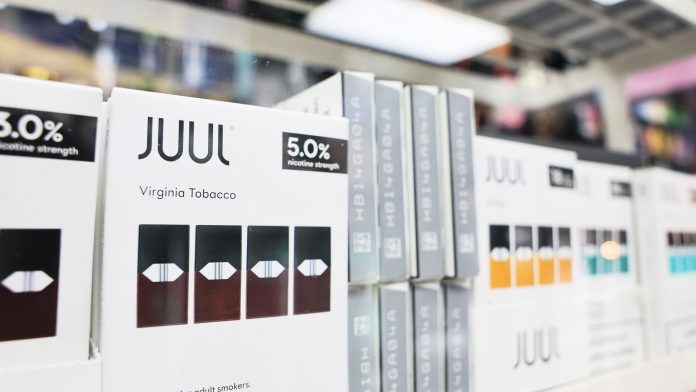Popular e-cigarette maker Juul Labs announced that the Food & Drug Administration (FDA) has approved the continued sale of its e-cigarettes and refill cartridges. The decision ends a multiyear review during which the organization investigated potential health risks.
Juul in the clear
The FDA ordered Juul to stop selling its e-cigarettes in 2022 to assess the products, nearly driving Juul to bankruptcy. Juul says the FDA has now decided its products are “appropriate for the protection of public health.”
An FDA spokesperson says this authorization doesn’t mean the products are FDA-approved, according to The Wall Street Journal. It means that the e-cigarettes meet the legal standards for marketing tobacco products in the U.S.
“Today’s FDA authorization of JUUL products marks an important step toward making the cigarette obsolete,” K.C. Crosthwaite, Juul Labs CEO, told Straight Arrow News in a statement. “More than 2 million adult Americans have switched completely away from deadly cigarettes using JUUL products.”
Straight Arrow News spoke with health expert Derek Yach, a former employee of the World Health Organization (WHO) and former president of the Foundation for a Smoke-Free World.
He agrees with Crosthwaite on this being a good day for people trying to quit cigarettes.
“[I feel] great happiness for the smokers who are trying desperately to get off their product, particularly those using menthol cigarettes, who now have an alternative that’s going to give them both the flavor and the nicotine that is going to have a huge benefit,” Yach said.
“I come from public health, where the definition of tobacco control is not about ending smoking only. It’s about ending the death and disease from smoking,” Yach continued. “And I know that vaping products now represent the most effective way of achieving complete cessation in smokers, far more effective than their nicotine replacement therapy.”
Policy differences
The ban on Juul products began under former President Joe Biden, whose administration took more of a hard line on vaping with a focus on eliminating teen vaping.
“Having somebody inside the FDA who wasn’t particularly supportive and the data and marketing of Juul not being particularly helpful contributed to not just setting back the progress of Juul itself but the entire vape sector for a while,” Yach said.
Many expected regulations to then ease under President Donald Trump, who reportedly promised to save vaping while on the campaign trail in 2024.
Teenage vaping
One of Juul’s biggest issues in the company’s history came from the pushback of teenagers using their products. Juul was largely blamed for the increase in teens using e-cigarettes.
The company says it will continue to build on the progress made to reduce underage nicotine use.
“Underage use of our products is down 98% since 2019, to one-half of one percent of youth,” Crosthwaite said.
Recent FDA data support the fact that fewer teens are using vapes.
“We’re at the lowest level of vaping and smoking for youth in the country and the lowest level of adult smoking in 50 years,” Yach said.
What does it mean for big tobacco?
While both Juul and Yach celebrate this decision as helping people eliminate cigarettes from their lives, big tobacco companies may view this in a different light.
Many of the biggest tobacco companies in the country, such as R.J. Reynolds and British American Tobacco, have already begun investing in e-cigarettes, and this ruling could encourage them to stay on that path.
“They’re betting big time that the categories of vape, heated tobacco, nicotine, patches will actually become the dominant source of revenue, which it is in many parts of the world,” Yach said. “They would see this as a signal that they’ve got to keep going on the track they’re already on.”
Despite that, a new study has raised concerns over the health of vaping. That study found some popular electronic cigarettes produce toxic metals at levels much higher than those found in conventional cigarettes.
That study shows that sometimes a day’s worth of vaping can release more lead than 20 packs of traditional cigarettes.

